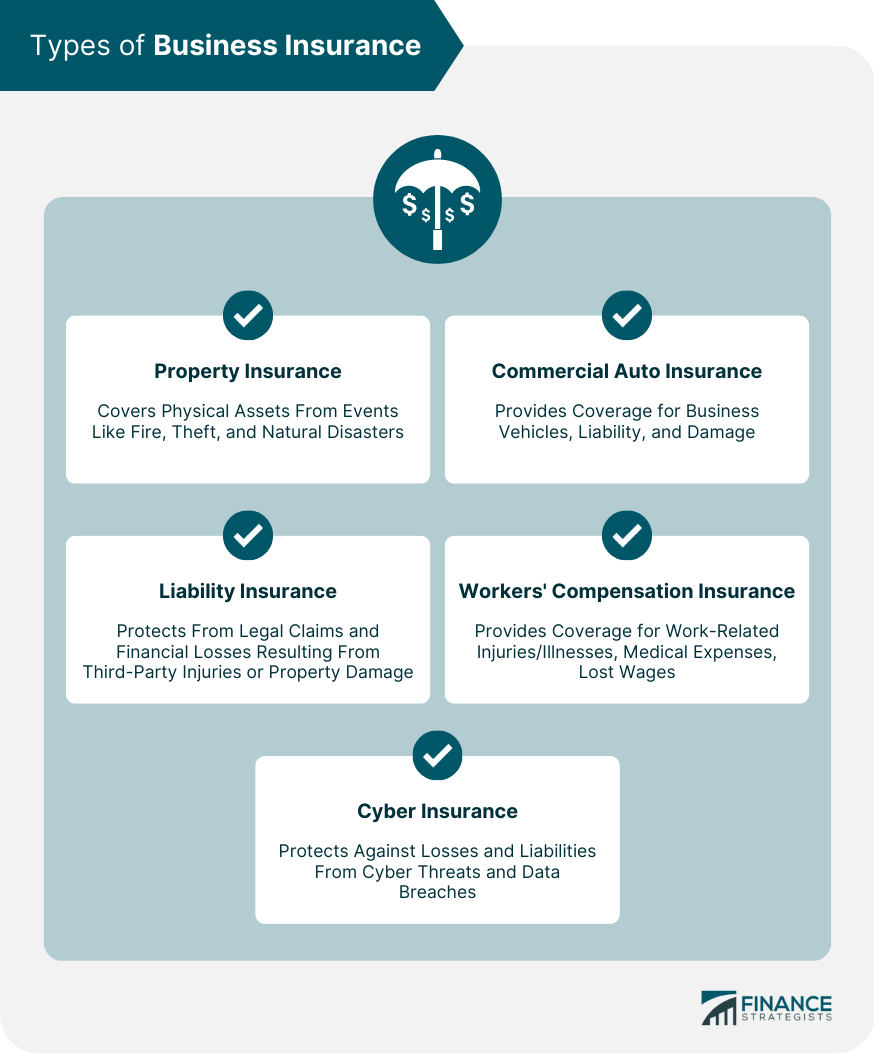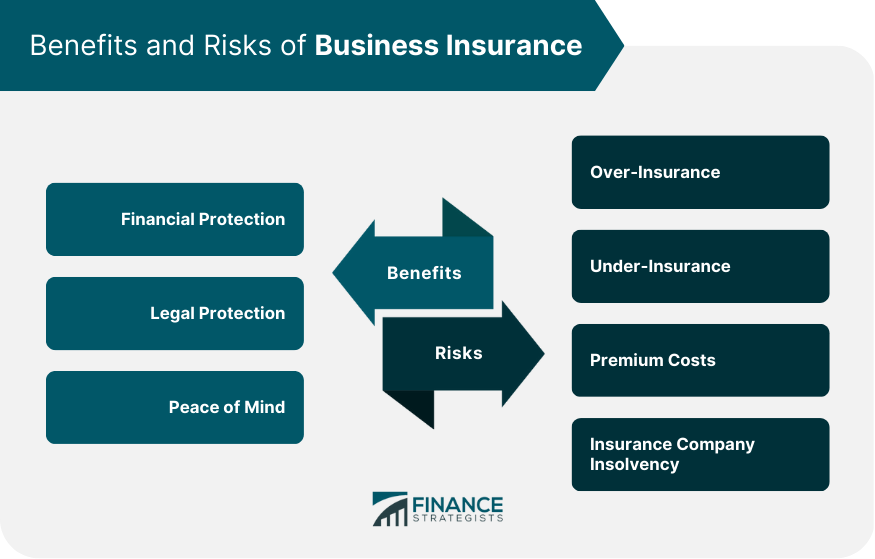Business insurance refers to a type of coverage that provides financial protection to businesses against various risks and losses. It is a contract between the business owner and the insurance company, where the insurance company agrees to compensate the business for covered losses in exchange for premium payments. Business insurance is crucial for protecting the financial stability and sustainability of a business. It helps mitigate the financial risks associated with unexpected events, such as property damage, liability claims, or lawsuits. By having the right insurance coverage, businesses can safeguard their assets, manage liabilities, and ensure continuity of operations in the face of potential risks. Business insurance works by transferring the financial risks faced by a business to an insurance company. The business owner pays regular premiums to the insurance company based on the coverage and policy terms. In return, the insurance company agrees to provide financial compensation or coverage for specific events or losses outlined in the policy. When a covered event occurs, such as property damage, theft, or a liability claim, the business owner files a claim with the insurance company. The insurance company assesses the claim and, if approved, provides the agreed-upon compensation or coverage as per the policy terms. Business insurance operates on the principle of spreading the risk among a large number of policyholders, allowing each business to pay a relatively small premium in exchange for protection against potentially significant losses. Property insurance covers the physical assets of a business, including buildings, equipment, inventory, and other tangible property. It provides compensation for losses due to events like fire, theft, vandalism, or natural disasters. Property insurance helps businesses recover and repair or replace damaged or stolen property, minimizing the financial impact of such events. Liability insurance protects businesses from legal claims and financial losses resulting from third-party injuries, property damage, or lawsuits. It covers legal defense costs, settlements, or judgments if the business is found legally liable for causing harm or injury to others. Liability insurance is crucial for businesses that interact with customers, clients, or the public and helps protect their financial interests in case of accidents, injuries, or property damage claims. Workers' compensation insurance provides coverage for employees who suffer work-related injuries or illnesses. It covers medical expenses, disability benefits, and lost wages for employees who are injured or become ill while performing their job duties. Workers' compensation insurance is typically required by law and helps protect businesses from potential lawsuits by employees seeking compensation for work-related injuries or illnesses. Commercial auto insurance provides coverage for vehicles used for business purposes. It includes liability coverage for third-party injuries or property damage, as well as coverage for damage to the insured vehicle. Commercial auto insurance is essential for businesses that own or use vehicles as part of their operations, protecting them from potential liability claims and financial losses resulting from accidents or damage to vehicles. Cyber insurance protects businesses against losses and liabilities arising from cyber threats and data breaches. It provides coverage for expenses related to data breaches, including legal costs, customer notification, credit monitoring, and reputation management. Cyber insurance helps businesses manage the financial and legal risks associated with data breaches, cyber-attacks, and other cyber incidents. The nature and industry of the business play a crucial role in determining the appropriate types of insurance coverage needed. Different industries have specific risks and requirements, and businesses should consider policies that align with their operations and potential risks. The size of the business, including the number of employees, annual revenue, and assets, can impact insurance needs. Larger businesses may require broader coverage and higher policy limits to adequately protect their assets and manage risks. The location of the business can impact the types and costs of insurance coverage. Businesses located in areas prone to natural disasters, crime, or other risks may need additional coverage to mitigate potential losses. Some industries have specific insurance requirements and regulations that businesses must comply with. For example, businesses in the healthcare industry may need malpractice insurance, while construction companies may require liability coverage for worksite accidents. Each business has unique risks and vulnerabilities that need to be considered when choosing insurance coverage. A risk assessment can help identify potential threats and determine the appropriate coverage needed to mitigate these risks. Business insurance provides financial protection to businesses against unexpected events or losses, including property damage, liability claims, and lawsuits. It helps minimize the financial impact of these events, allowing businesses to recover and continue operations. Business insurance provides legal protection to businesses, covering legal defense costs, settlements, or judgments resulting from liability claims or lawsuits. It helps protect businesses from potential legal and financial consequences of third-party claims and lawsuits. Business insurance provides peace of mind to business owners, knowing that they have coverage and protection against potential risks and losses. It allows businesses to focus on their operations and growth, rather than worrying about potential liabilities or unexpected events. Over-insurance occurs when businesses purchase more coverage than needed, resulting in higher premiums and unnecessary costs. Over-insurance can be a significant financial burden for businesses, reducing their profitability and competitiveness. Under-insurance occurs when businesses purchase insufficient coverage, leaving them vulnerable to potential risks and losses. Under-insurance can result in significant financial losses and liabilities, as businesses may not have adequate coverage to manage unexpected events or claims. Insurance premiums can be a significant expense for businesses, affecting their profitability and cash flow. Businesses should carefully consider the costs and benefits of different coverage options to determine the most cost-effective insurance solutions. Insurance company insolvency can result in the loss of coverage and protection for businesses. It can be challenging to recover losses or liabilities from insolvent insurance companies, putting businesses at risk of significant financial losses. Business insurance refers to a type of coverage that provides financial protection to businesses against various risks and losses. Business insurance works by transferring the financial risks faced by a business to an insurance company. In return, the insurance company provides financial compensation or coverage for specific events or losses outlined in the policy. Types of business insurance include property insurance, liability insurance, workers' compensation insurance, commercial auto insurance, and cyber insurance. Factors to consider when choosing business insurance include the type of business, business size, business location, industry regulations, and business risks and vulnerabilities. Benefits of business insurance include financial protection, legal protection, and peace of mind. Risks of business insurance include over-insurance, under-insurance, premium costs, and insurance company insolvency. Business insurance is a critical component of a comprehensive risk management strategy for businesses of all sizes and industries. Businesses should carefully consider their insurance needs and work with experienced insurance professionals to determine the most appropriate coverage options. By managing risks and protecting their financial interests, businesses can achieve greater stability, sustainability, and success.What Is Business Insurance?
How Business Insurance Works
Types of Business Insurance
Property Insurance
Liability Insurance
Workers' Compensation Insurance
Commercial Auto Insurance
Cyber Insurance

Factors to Consider When Choosing Business Insurance
Type of Business
Business Size
Business Location
Industry Regulations
Business Risks and Vulnerabilities
Benefits of Business Insurance
Financial Protection
Legal Protection
Peace of Mind
Risks of Business Insurance
Over-Insurance
Under-Insurance
Premium Costs
Insurance Company Insolvency

Final Thoughts
Business Insurance FAQs
Business insurance refers to a range of policies that protect businesses against financial losses caused by unexpected events such as theft, damage, or lawsuits.
If you run a business, it's important to have adequate insurance coverage to protect your assets and minimize the risk of financial loss. It's a good idea to speak to an insurance professional to determine your specific needs.
There are many types of business insurance, including property insurance, liability insurance, workers' compensation insurance, and commercial auto insurance, among others.
The cost of business insurance varies depending on the type of coverage needed, the size of the business, and the level of risk involved. It's best to get a quote from an insurance provider to determine the cost.
Business insurance provides financial protection against unexpected events, legal protection against lawsuits, and peace of mind knowing that your assets are covered in the event of an incident.
True Tamplin is a published author, public speaker, CEO of UpDigital, and founder of Finance Strategists.
True is a Certified Educator in Personal Finance (CEPF®), author of The Handy Financial Ratios Guide, a member of the Society for Advancing Business Editing and Writing, contributes to his financial education site, Finance Strategists, and has spoken to various financial communities such as the CFA Institute, as well as university students like his Alma mater, Biola University, where he received a bachelor of science in business and data analytics.
To learn more about True, visit his personal website or view his author profiles on Amazon, Nasdaq and Forbes.















